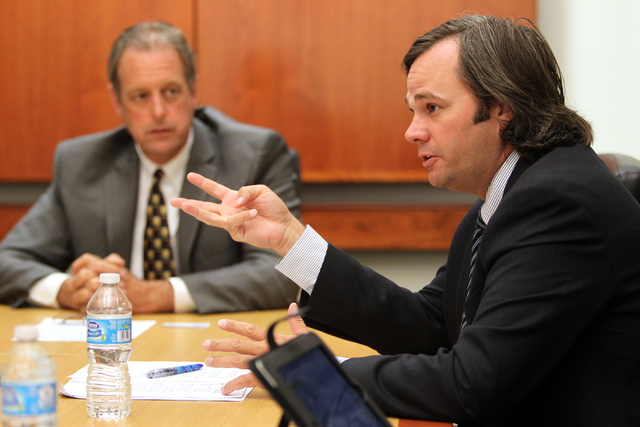Public records battle expected to resume at Nevada Legislature
CARSON CITY — Just as the swallows return to Capistrano every spring, the advent of a new session of the Legislature means that the long-simmering debate over access to public records will begin once again in Nevada.
At least five bills have been requested dealing with the issue of access to government information.
That includes Senate Bill 28, which seeks to define what constitutes the “extraordinary use” of personnel or technological resources to comply with a public records request.
The bill, sought by the Nevada League of Cities and Municipalities, would define extraordinary use as requiring more than 30 minutes of time to comply with a request, or result in more than 25 pages of records.
The proposal is already generating attention from government entities and open-government advocates. The Legislature convenes Feb. 2.
Supporters of the public records law argue the public can’t properly participate in the democratic process if records are withheld from view, either by design or for other reasons. Government agencies argue that they should be able to recover expenses from fulfilling complicated records requests.
Just ask Robert Fellner, a transparency researcher with the Nevada Policy Research Institute, who this year sought payroll information from the city of Mesquite. The conservative think tank, which publishes public employee salary data on its website, only received the information in a usable format after a newspaper column appeared in the local paper highlighting the failed efforts to obtain the information.
While the state’s public records law does allow government entities to charge for extraordinary use of personnel or resources, Mesquite is the only city in the history of TransparentNevada to assert that reporting its payroll information to the public required such an effort, Fellner said in the column written in July 2014.
League Executive Director Wes Henderson said SB28 is being sought simply to allow government entities to recoup costs associated with extraordinary requests by defining what such a request entails.
“Our members believe in open and transparent government, but some requests that come in require an employee to stop their primary functions to comply with that request,” he said. “Our members just want to recoup their costs.”
But Barry Smith, executive director of the Nevada Press Association, said previous work by the association and others to cap the extraordinary use of resources cost at 50 cents a page would be eliminated with the proposed change.
“To make it 50 cents a page plus the cost of the time for the employee who has to fulfill the request goes completely counter to the clear language of the law which is the actual cost of providing the record,” he said.
Fellner said he would be concerned with any legislation that would allow public agencies to charge more for public records.
Charging any amount for records that are supposed to be public is a way to discourage such requests, he said. Allowing higher fees also could be a way for an agency to increase revenue even though that is not the intent of the public records law, Fellner said.
“Fees are a way to limit access even if they are justified,” he said. “Just by definition they are a barrier to access.”
Fellner, who deals with public agencies in Nevada and California in making records requests, said he has encountered cases where high fees were sought to try to discourage a records request. Once an attorney gets involved, those fees often end up at a minimal amount and the information is provided, he said.
But for an average citizen, such stalling tactics can be effective, Fellner said.
Public employees are paid a salary to perform their jobs, and providing the public with information about what they are doing is one of the most important functions they have, he said.
“I would be extremely concerned with any such proposal,” Fellner said.
ELECTED OFFICIALS HIT BARRIERS, TOO
Assemblyman Skip Daly, D-Sparks, who lost his re-election bid in November in the GOP sweep, knows firsthand about the problems the public has in obtaining public records.
Daly, the business manager at Laborers Union Local 169 in Sparks, spends time on the job seeking out records from various government agencies to examine bidding information on public projects.
“There are problems all over the board,” he said.
In some cases public employees don’t know the rules about providing information, Daly said. Others use the rules to deny access for as long as possible. Some agencies charge the maximum amount of money possible to make it tougher to get information, he said.
“What the law says is that unless the record is otherwise declared to be confidential, it is a public record,” Daly said. “If you don’t like that, then change the law.”
One concern is that public records are supposed to be accessible during business hours, he said. But if you visit an agency to examine records, they usually ask for a written request despite the fact that one is not required in the law, he said.
Daly said he planned to introduce legislation to further clarify some of these issues but will now have to participate as a lobbyist or member of the public.
“It isn’t a partisan issue,” he said. “It’s something that we just want to get right.”
Ryann Juden, chief of staff to North Las Vegas Mayor John Lee, said that when the league bill draft was discussed at a meeting of the City Council last month, the mayor made it clear that he does not want to make it more difficult for the public or press to access public information.
“In his view, many of the problems he inherited coming in were the result of an obstructionist type of government that should have had more public scrutiny,” Juden said.
But there are occasions, such as with the medical marijuana application process, where private commercial entities want information that isn’t readily available, he said. In such situations, or where developers or marketers want public information for for-profit ventures, there should be a way to recoup the costs of staff time to generate such data, Juden said.
North Las Vegas has told the Review-Journal in response to a request for a municipal judge’s emails and a separate request for Juden’s emails that it costs $82.66 an hour to pull emails. For the request concerning Municipal Court Judge Catherine Ramsey’s emails, the city said it would be necessary to have the city attorney’s office review the emails because the city is engaged in litigation with Ramsey and some emails might be covered by attorney-client privilege. It would be an additional $120 for each hour the city attorney’s office spent reviewing the emails.
GETTING ACCESS CAN BE COSTLY
If a member of the public wants to see emails exchanged between Clark County government officials, for example, the county will charge the requester $50 an hour. That’s for the work a county systems programmer does in retrieving and processing the records.
The county often gives estimates of two hours of time when the Review-Journal makes such requests, charging $100 for emails exchanged between two parties.
But the public shouldn’t assume that the employee processing the request is making exactly $50 an hour. In reality, the 12 systems programmers who can do that job earn a base hourly wage that varies. On the low end, one of those employees receives a base hourly wage of $34.95 and nine of them make $42.37 an hour.
When the public pays the county for a public records request, they’re also paying for the employees’ benefits, too — not just their base hourly wage. The county estimates that federal and state mandates for retirement and Medicaid as well as other benefits bring the “actual cost range” to between $49.47 and $59.97, county spokesman Erik Pappa said in an email.
“For simple ease of accounting we have traditionally used $50 per hour,” Pappa said in the email.
The Review-Journal requested an interview with Clark County’s legal counsel, Mary-Anne Miller, to discuss the county’s charging policies for public records requests. She declined to meet with a reporter to answer questions about county public records practices.
Louis Carr Jr., the county’s chief information officer over the Information Technology Department, also would not meet with a reporter to answer questions about how his department handles email records requests from the public.
The Las Vegas Review-Journal has taken legal action in one case to gain access to public records in an ongoing newspaper investigation into a secretive witness payment program.
The legal action filed last month is the result of Clark County District Attorney Steve Wolfson’s “prolonged campaign” to hinder the newspaper from “carrying on their constitutionally protected business and vital public service of reporting the news,” the lawsuit filed in District Court says.
The Review-Journal has published a series of articles on the district attorney’s decade-long practice of paying witnesses’ rent using an off-budget checking account. Some of the payments were for as much as $1,000.
SOME PROGRESS MADE
There has been some progress on the thorny issue of public records access at the state level. Late last month, the Legislative Commission gave final approval to a regulation addressing public records requests from state agencies.
The press association’s Smith said the regulation could prove to be a good model for other government entities to emulate in addressing the issue.
Among other issues, the law setting forth the rules requires each agency to designate an employee of the agency to act as its records official to handle requests.
“It’s a good road map,” Smith said. “There are a lot of good policies in that manual.”
But there are some issues that need to be cleaned up, such as the fact that there is no definition of a public record in the statute, even though there is one in the regulation, he said. Another issue is the number of exemptions to public records and whether they are consistent, Smith said.
Other public records-related bills expected in the upcoming session include one to clarify that those applying for medical marijuana licenses for dispensaries, growing facilities and other functions are public, and another from the attorney general’s office that has not yet been released for review.
Review-Journal reporters Bethany Barnes and Ben Botkin contributed to this report. Contact Sean Whaley at swhaley@reviewjournal.com or 775-687-3900. Find him on Twitter: @seanw801.




























